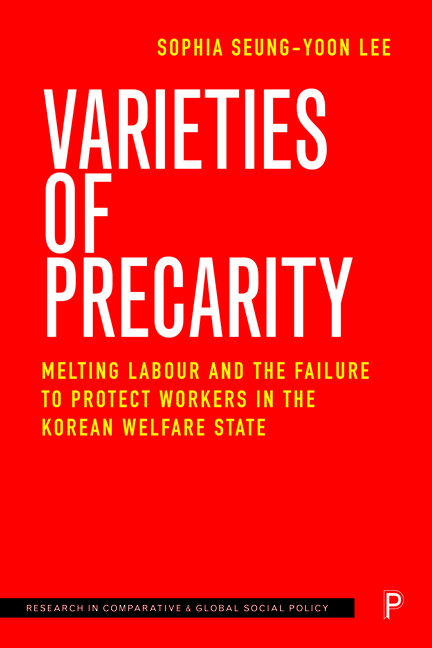 Varieties of Precarity
Varieties of Precarity Book contents
- Frontmatter
- Contents
- Series editors’ preface
- List of figures and tables
- Acknowledgements
- 1 Introduction: Melting labour and institutional inconsistency
- 2 Social protection policies and the South Korean labour market in comparative perspective
- 3 When insiders are kicked out: layoffs of regular workers in manufacturing
- 4 Same boat, different destiny: subcontracted workers in the Korean shipbuilding industry
- 5 Young and old outsourced female workers in call centres and cleaning services
- 6 Are freelancers really free? The Korean freelance labour market and the precarity of young freelancers
- 7 The digital precariat: various Korean platform workers and the new work logic
- 8 Conclusion: Towards universal institutional protection for precarious workers in the era of melting labour
- Notes
- References
- Index
5 - Young and old outsourced female workers in call centres and cleaning services
Published online by Cambridge University Press: 03 April 2024
- Frontmatter
- Contents
- Series editors’ preface
- List of figures and tables
- Acknowledgements
- 1 Introduction: Melting labour and institutional inconsistency
- 2 Social protection policies and the South Korean labour market in comparative perspective
- 3 When insiders are kicked out: layoffs of regular workers in manufacturing
- 4 Same boat, different destiny: subcontracted workers in the Korean shipbuilding industry
- 5 Young and old outsourced female workers in call centres and cleaning services
- 6 Are freelancers really free? The Korean freelance labour market and the precarity of young freelancers
- 7 The digital precariat: various Korean platform workers and the new work logic
- 8 Conclusion: Towards universal institutional protection for precarious workers in the era of melting labour
- Notes
- References
- Index
Summary
‘I slipped and broke my bones while working on the stairs.
I received medical expenses privately, but my subcontractor came and asked me to sign a statement agreeing that they could not give Industrial Accident Compensation Insurance benefits.’ (Apartment cleaning worker, age 76)
The gender gap in the Korean female labour market
This chapter examines the rise of precarious jobs through outsourcing in the service economy, particularly affecting young and old female workers. The chapter sheds light on the inconsistencies between institutions for decommodification and melting labour, leading to an expansion of female precarious workers in the Korean labour market. The problems faced by these newly emerging forms of work overlap with those of non-regular workers, and it is necessary to comprehensively examine both types of issues. Through empirical data and interviews with 23 workers and union leaders, the chapter highlights the gender gap in the Korean labour market, focusing on young female call centre workers and examining the issues of institutional protection and job instability surrounding older and younger female subcontracted labour in call centres and cleaning services. The chapter underscores how outsourcing has become more accessible due to technological development and offers insights into the unique challenges faced by female workers in precarious forms of work.
The Korean female labour market is characterised by a high concentration of females in irregular employment and a wide wage gap. Despite the fact that more than 82.8 per cent of Korean women have tertiary education degrees as of 2020, the wage gap between genders in Korea is still high, at 33 per cent, which is significantly higher than in the US (19 per cent), the UK (13 per cent) and Germany (3 per cent) (Jung E.H., 2015). Lee S.Y. and Kim Y.H. (2020) also pointed out the barriers to gender pay equality presented by the South Korean gendered dual labour market structure, particularly the gendered division between regular and irregular work. While there has been some progress in recent years, with the ratio of female to total male earnings increasing from 58 per cent in 2006 to 64 per cent in 2018, this progress has been limited given the narrow and decreasing educational attainment gap between men and women and the introduction of legislative measures to address gender discrimination in the labour market.
- Type
- Chapter
- Information
- Varieties of PrecarityMelting Labour and the Failure to Protect Workers in the Korean Welfare State, pp. 98 - 118Publisher: Bristol University PressPrint publication year: 2023
